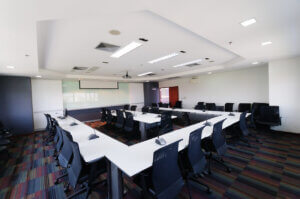I suspect it has happened to all of us. You arrive at the client’s location with 30 minutes to prepare the room for your half-day session with the organization’s leadership team. You specifically requested the room to be set up in a U-shape with three flip charts, markers, and computer projection. You only need 15 minutes to prepare the room, so you are feeling pretty good, until you walk through the door. The best you can say is, “Well, at least the room has tables in a u-shape and there is a projector mounted to the ceiling.” But there are no chairs, no flip charts, no markers, and no one around to help you.
You spend the next 25 minutes getting assistance to gather everything you need, and then you are scrambling to do your 15 minutes of set-up in 5 minutes. You have to start the session 5 minutes late, you’re sweating already, and your heart is racing. So much for the calm start.
To prevent this from happening to you, we recommend the following.
For an UNFAMILIAR Location
- To determine your arrival time for an unfamiliar location, we recommend that you take your start time, subtract the time you need to set-up and then subtract another 30 minutes.
- The resulting time is your recommended arrival time.
- As an example, if the session starts at 9:00 AM, and set-up requires 20 minutes, we recommend that you arrive at 8:10 AM (9:00 AM minus 20 minutes, minus 30 minutes).
For an FAMILIAR Location
If you are familiar with the room in which you will be working and can confirm that all the items you need will be present, far less “just in case” time is needed.
- To determine your arrival time for a familiar location, we recommend that you take your start time, subtract the time you need to set-up and then subtract another 15 minutes.
- The resulting time is your recommended arrival time.
- As an example, if the session starts at 9:00 AM, and set-up requires 10 minutes, we recommend that you arrive at 8:35 AM (9:00 AM minus 10 minutes, minus 15 minutes).
If everything does go according to plan, you can use the extra time to collect your thoughts, have some coffee, and prepare for the challenging day ahead! If things don’t go your way, you’ll be glad to have the extra time!
To learn more about facilitation skills, consider our course, The Effective Facilitator. The four-day course provides a structured approach for leading teams and facilitating meetings and covers over 100 techniques for getting amazing results from groups.
About the Author
Michael Wilkinson is the trailblazing Founder of Leadership Strategies, renowned as the foremost provider of professional facilitators and facilitation training in the US. As a Certified Master Facilitator and a Certified Professional Facilitator, Michael’s expertise is in high demand as a trainer, facilitator, and keynote speaker. With a track record of leadership in the facilitation industry, including roles as past president of the Southeast Association of Facilitators, creator of the FindaFacilitator.com database, and founding board member of the International Institute of Facilitation, Michael is a leader in the industry. Dive deeper into his wealth of knowledge through his acclaimed books, including The Executive Guide to Facilitating Strategy, The Secrets of Facilitation, The Secrets to Masterful Meetings, and CLICK: The Virtual Meetings Book.


